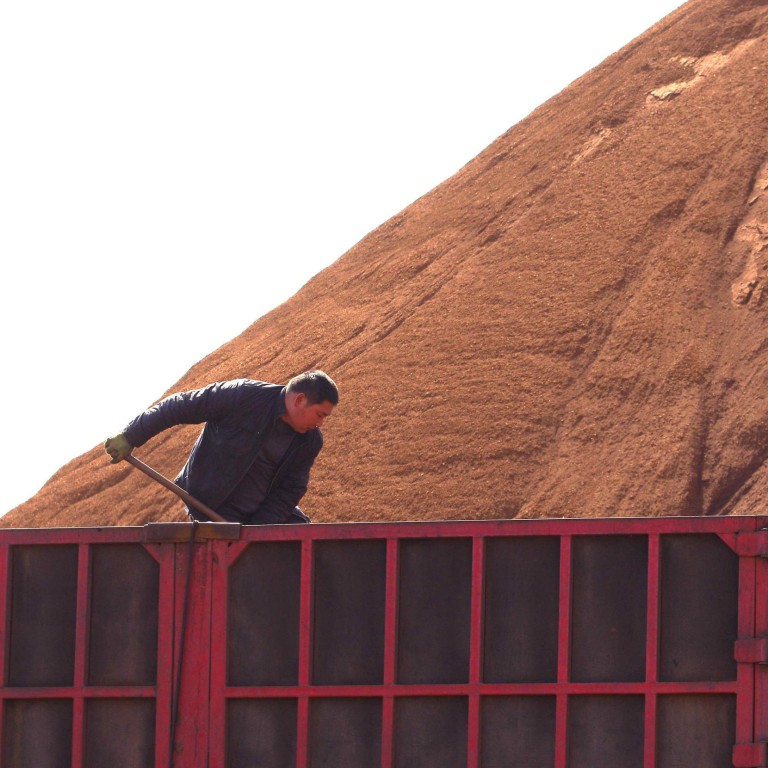
Iron ore price falls more after Beijing's tax relief but steel mills get boost from support policies
Steel mills enjoy double benefits from lower power prices in the latest support policies
Beijing has cut power prices for manufacturers and commercial firms and slashed the resources tax for iron ore miners in the latest measures to support the slowing economy, but the move saw iron ore prices fall further as worries over a supply glut deepened.
Iron ore futures for September delivery on the Dalian Commodity Exchange dropped 2 per cent to 378 yuan (HK$478) yesterday, offsetting most of the tax relief, as traders worried it would sustain loss-making operations longer.
The measures, announced on Wednesday by the State Council, would benefit the industrial sector most, especially loss-making steel mills, as their key raw material became even cheaper after they fell to their lowest in a decade while helping them save on electricity costs.
"The reduction in resources tax on iron ore will improve profitability of some ore producers in the short term … but it also looks like an effort by China to protect its domestic industry at the expense of foreign miners," said Rahul Goel, the head of projects planning and business development at General Nice Group, the mainland's largest privately owned iron ore trader.
Mainland miners produce about a fifth of the iron ore consumed by the domestic steel industry, and the rest is imported mainly from the three mining giants in Australia and Brazil, whose higher ore quality and lower production costs meant they have taken market share from mainland players as ore prices slid 60 per cent in the past 12 months.
John Yeap, a partner at law firm Pinsent Masons who specialises in energy and infrastructure transactions, said that while Beijing's resources tax cut was aimed to ensure viability of its domestic iron ore industry, it also left open the possibility for Australia to respond in a similar manner to protect its producers.
Analysts said Beijing's move to cut the tax from 80 per cent to 40 per cent of the standard levies of 13 to 25 yuan per tonne, depending on the ore's iron content, would not help domestic miners much.
The tax relief, effective on May 1, amounts to 5.40 to 10 yuan per tonne, compared to the 200 to 500-yuan production costs at most domestic miners.
"It allows high-cost miners to sustain operations for longer, especially state-owned ones supported by local governments keen to avoid job losses and bankruptcies," Moody's Investors Service analyst Zou Jiming said.
Citic Securities analyst Liu Haibo said in a note that given the costs at domestic mines were up to three times as high as those at the lowest-cost overseas producers, their long-term outlook was bleak.
He added that capacity utilisation at domestic players had dropped to 60 per cent from 85 per cent in late 2013.
Mainland steel mills will also benefit from lower power costs, which Liu said amounted to about 7 per cent of their production cost, compared with 37 per cent for iron ore.
The power prices charged by coal-fired power plants to distributors would be cut by two fen per kilowatt-hour (kWh), while those charged by distributors to industrial and commercial end-users would be slashed by 1.8 fen per kWh, the State Council said.
The cuts reflect lower coal prices under a coal cost pass-through mechanism that stipulates that power prices will be adjusted when coal prices move more than 5 per cent over a 12-month period.
The difference in the wholesale and retail power price cuts will allow power grids to absorb more expensive power fired by cleaner-burning natural gas plants and plants retrofitted with facilities to filter out nitrogen oxide and particulate emissions.
The most energy-intensive and pollution-prone factories will continue to be subject to higher "punitive" power prices to keep their expansion in check and encourage them to close outdated and uncompetitive facilities.
Credit Suisse's regional head of utilities research Dave Dai said in a note that the two-fen, or 5 per cent, power price cut was higher than his expectation of 4.3 per cent.
He expects power producers to face further headwinds in the years ahead when competitive power pricing is introduced.

